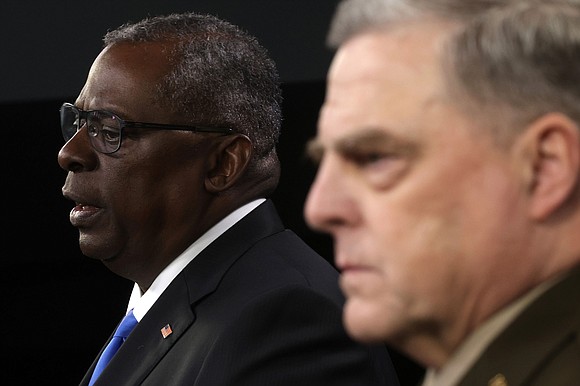Milley says he personally informed senior Trump officials of call with Chinese counterpart
CNN/Stylemagazine.com Newswire | 9/28/2021, 9:52 a.m.

Originally Published: 28 SEP 21 09:31 ET
Updated: 28 SEP 21 10:37 ET
By Zachary Cohen and Oren Liebermann, CNN
(CNN) -- Top US General Mark Milley offered a full-throated defense of his behavior during the last days of the Trump administration, including a phone conversation with his Chinese counterpart, as he and other senior military officials appeared before lawmakers on Tuesday for a hearing about the withdrawal from Afghanistan.
Specifically, Milley said the call with the Chinese official was not only appropriate, but that numerous senior Trump officials were aware it occurred.
"I personally informed both Secretary of State [Mike] Pompeo and White House Chief of Staff [Mark] Meadows about the call, among other topics. Soon after that, I attended a meeting with Acting [Defense] Secretary [Chris] Miller, where I briefed him on the call," he told members of the Senate Armed Services Committee.
Milley and Secretary of Defense Lloyd Austin are testifying publicly before Senate lawmakers Tuesday, the first time that top military officials will appear before Congress since the full withdrawal of US troops from Afghanistan.
Austin and Milley are joined by the leader of US Central Command, Gen. Frank McKenzie, who played an integral role in facilitating the evacuation from Kabul -- an effort that has been the focus of immense bipartisan criticism since the last American military aircraft departed the Afghan capital.
Milley is also likely to be grilled about new reporting in "Peril," a book by Washington Post reporters Bob Woodward and Robert Costa, which details the military leader's phone conversations to reassure a nervous Chinese general and his efforts to limit then-President Donald Trump from potentially ordering a dangerous military strike.
Milley's actions, which were reported by CNN and others earlier this month ahead of the book's release, spawned sharp criticism from Trump and his allies, including calls for Milley's resignation and that he be tried for treason.
'We wanted to be ready and we were'
In his opening remarks, Austin emphasized the planning that preceded the evacuation from Afghanistan and the positioning of forces that allowed troops to arrive in Kabul fairly quickly as the evacuation began. As early as spring, the Pentagon began thinking about the possibility of a non-combatant evacuation and preparing for a number of scenarios, Austin said. By early June, Austin pre-positioned forces in the region, he said, including three infantry battalions.
"We wanted to be ready, and we were," he said.
Although the first two days of the evacuation were "difficult," Austin acknowledged, US troops restored order in 48 hours, and the herculean effort to move tens of thousands of American citizens and at-risk Afghans began in earnest.
"We are still working to get Americans out who wish to leave," Austin said, though that is now the job of the State Department and the interagency, not the military. Lawmakers have repeatedly criticized the Biden administration for concluding the military evacuation and withdrawal from Afghanistan while there were still American citizens who wanted to leave the country. They have also criticized the administration's inability to say just how many Americans are left in Afghanistan.
On Monday, a senior State Department official said the department is working to get out approximately 100 US citizens and Afghan Green Card holders from Afghanistan, but there was no indication of when that might happen or by what route they would leave the country.
Ongoing mission
"Even with no military presence on the ground, that part of our mission is not over," Austin said.
Austin also defended the military's decision to transfer Bagram Air Base to the Afghan National Defense and Security Forces, a move which quickly saw the sprawling base and hub of US operations fall to the Taliban. He said it would have required 5,000 troops to defend Bagram, and it would have "contributed little" to defending the embassy in Kabul about 30 miles away, which was initially the primary mission.
"Staying at Bagram, even for counter-terrorism purposes, meant staying at war in Afghanistan, something that the President made clear he would not do," Austin said.
As he neared the end of his opening remarks, Austin shifted his focus to the entire 20-year war, asking if the US had the right strategy, if it believed falsely that it could build an Afghan government that would last, and if it could create a self-sustaining Afghan military. Austin admitted frankly that the US never understood the problems on the ground in Afghanistan, including endemic corruption that undermined and delegitimized the US-backed government. The collapse of the Afghan army in the face of a Taliban offensive "took us all by surprise," Austin said.
"We helped build a state, but we could not forge a nation," Austin said.
This story is breaking and will be updated.








